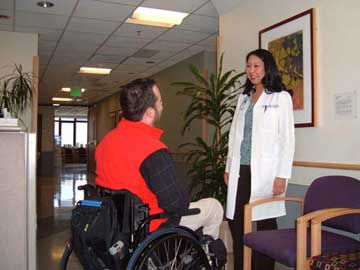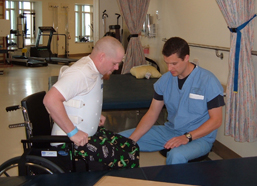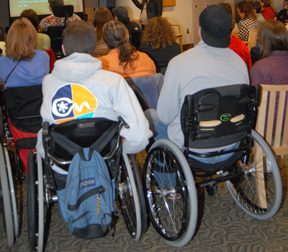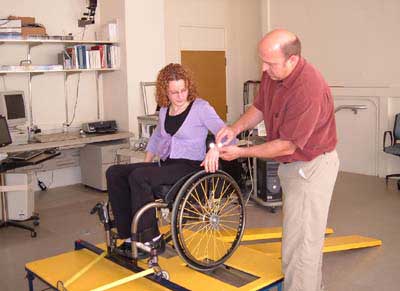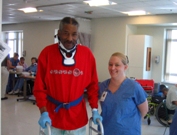Spinal Cord Injury Update
Summer 2010: Volume 19, Number 3
Living with SCI–Peers Show the Way
Some readers may recall this scenario, others will have to imagine it…
You are lying in a hospital bed and your doctors have just told you that you suffered a spinal cord injury. You may never walk again, and you are learning about the other, unexpected, bodily functions that don’t work the way they are supposed to. As the days go by, you get a crash course about what it means to be paralyzed. Despite the mountain of information therapists and nurses provide, you still have a thousand questions about what it’s really like to live with a spinal cord injury. Can life possibly go on? And, if so, what does it look like?
This is where SCI peer mentors come in. Peer mentors are individuals with experience living with SCI who visit newly injured patients in the hospital. Unlike anyone else likely to visit you, an SCI peer is the one person who really has been where you are.
“When a peer visits, the patient meets someone with SCI who has been out of the hospital for a while, living their life, doing things that they enjoy, and doing the same things that everybody has to do,” says Chris Garbaccio, who coordinates the peer mentor program for the Northwest Regional Spinal Cord Injury System (NWRSCIS). Since SCI is relatively rare, most people have never met anyone with SCI before their injury. “I believe that the actual advice a peer gives is often secondary to simply showing the patient that ‘yes, life does go on after your injury, and I’m here to prove it.’”
Peer visiting at the University of Washington (UW) took place informally for several years until a 2003 grant from the Christopher and Dana Reeve Foundation (CDRF) allowed the UW to create a formal program to train and maintain a team of peer mentors serving newly injured SCI patients at Harborview and the UW Medical Center. After the CDRF grant ended, the program continued with National Institute for Disability and Rehabilitation Research (NIDRR) funding.
“We know from clinical experience and research conducted on other populations that meeting with a peer has many benefits,” says Jeanne Hoffman, PhD, UW rehab psychologist in charge of the Peer Mentor program. “Being told by physicians and therapists that a good life is still possible after SCI doesn’t have the credibility of hearing it from someone who is living it.”
Furthermore, insurance restrictions have made the inpatient rehab stay shorter than ever before, and patients are justifiably nervous about leaving the safety of the hospital and coping on their own. Getting support and “survival tips” from another person with SCI who lives out in the community is invaluable.
Currently there are approximately 40 men and women with different types of SCI (tetraplegia vs. paraplegia, complete vs. incomplete, wheel chair users (power vs. manual) vs. ambulators) who have expressed an interest in being a peer and who have completed training. Individuals who become peers have been referred by rehabilitation staff or have expressed a desire to meet with other individuals because of the positive experience they had meeting with a peer early on after injury.
Peers are trained to leave the discussion open ended in order to best meet whatever needs the patient has at that moment. Some patients will ask very detailed questions about wheelchairs or driving or caregivers, others may just want to hear the peer’s story of how they got from rehab to where they are today.
Garbaccio works with hospital staff to match newly injured SCI inpatients with trained peer mentors of the same sex and similar injury level, age, and life circumstances. While no two spinal cord injuries are exactly alike, even at the same injury level, efforts are made to match individuals as closely as possible and find a peer who might be most helpful.
Patients are offered the opportunity to meet with a peer while they are in inpatient rehabilitation. Although many are interested or even eager to meet another person with an SCI, “some people feel too overwhelmed and can’t see how a peer could help them,” says Garbaccio. “Others are resistant because they are not ready to accept that this has happened to them, and meeting someone can make it very real. Of course, that is fine. We want it to be a positive experience.”
Aditya Ganapathiraju, who has C5 tetraplegia, was reluctant to meet others with SCI when he was first injured. “I remember feeling like I did not want to be associated with anyone with a disability because I did not consider myself to be like ‘them.’” he admits. Still, he did agree to meet a peer. Later, he recognized that the experience “was helpful because of the insights they offered and also their mere presence as people with SCI who were just getting on with their lives despite everything.” He has been a UW peer mentor since 2006.
People are often motivated to become peers because of the help they received from peer mentors during their own inpatient stay. “My mentor showed me a lot of things about how to live as a quad,” says Joe Meyer, who has C4 tetraplegia.“There are so many things I would still be struggling with if not for his sharing of experience. I became a peer mentor in the hopes that I could provide someone else with the same type of very helpful information that he had given me, and to reassure them that you can live and function successfully and happily as a quadriplegic.”
Anne Bostwick, who was injured before the UW peer mentor program started, became a peer because “I wanted to provide a positive role model for newly injured women. We (women) are in the minority in the world of SCI.”
Having a peer visit “lets the patient see that a productive and happy life is possible after SCI,” Anne says. “I think it gives them hope, plus a sounding board with someone who can totally relate. Sometimes just listening is the most important part of mentoring. Most newly injured people are still in shock when you see them.”
“Peer mentors make an powerful and positive impact on patients at a critical, vulnerable time,” says Hoffman. “We are enormously grateful for their time and willingness to share such personal aspects of their lives.”
If you have questions about peer mentoring, please contact the NWRSCIS peer program at 206-616-8568 or nwrscis@uw.edu.

